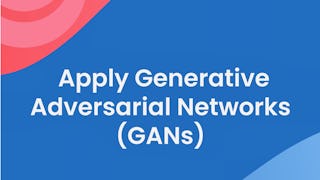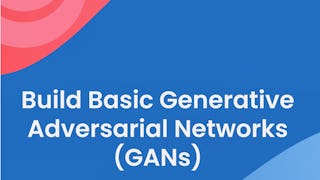Updated in May 2025.
This course now features Coursera Coach! A smarter way to learn with interactive, real-time conversations that help you test your knowledge, challenge assumptions, and deepen your understanding as you progress through the course. Embark on an enlightening journey into the realm of Generative Adversarial Networks (GANs), where you will master the art of AI-driven image synthesis. This course begins with a solid foundation, introducing you to the basic concepts and components of GANs, such as the Generator and Discriminator. From there, you will delve into the intricacies of fully connected and deep convolutional GANs, understanding their architectures, and learning how to implement and optimize them effectively. The course progresses with hands-on tutorials using popular datasets like MNIST and CIFAR-10, where you will learn to load, preprocess, and train GAN models. Each step is meticulously explained, ensuring you gain practical knowledge and experience. By leveraging tools such as Google Colab, you will explore the capabilities of GPU acceleration, enhancing your model training efficiency and performance. As you advance, you will tackle more sophisticated topics, including Conditional GANs, label embedding, and model optimization techniques. The course culminates with practical projects where you apply your knowledge to generate and analyze realistic images, bridging the gap between theoretical concepts and real-world applications. This comprehensive approach ensures you emerge with the skills and confidence to harness the full potential of GANs in your projects. This course is designed for data scientists, machine learning engineers, and AI enthusiasts who have a basic understanding of neural networks and Python programming. Familiarity with deep learning frameworks like TensorFlow or Keras is recommended but not mandatory.
















